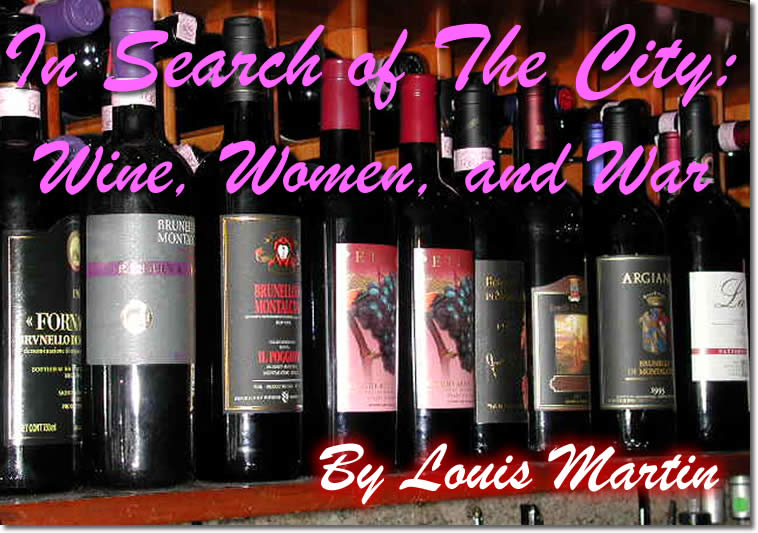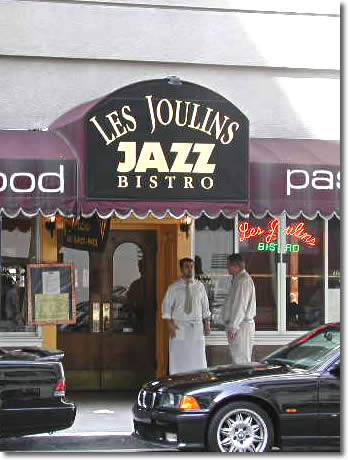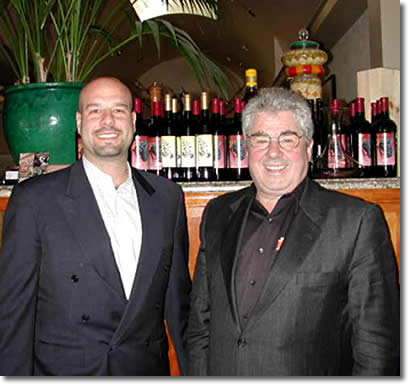Home | City Notes | Restaurant Guide | Galleries | Site Map | Search | Contact

With my personal relationships in a shamble and the country at war as well, if war is what you want to call the massive bombing of an ancient city, I headed to North Beach Restaurant for something to buck me up. I knew the food to be the best, but I was curious about something: I had heard that owner Lorenzo Petroni was producing his own wine from property he owned in Sonoma.
It was dinner time when I arrived on Tuesday, and we sat at a small table in the back of the Tuscan-style restaurant near the waiters' station. While I was curious about the wine, I first asked Lorenzo about himself.

"I come from Lucca, a small town west of Florence. I came to this country when I was nineteen years old." He came by himself and was supposed to go to school as an exchange student, but after a month he realized his heart was in the restaurant business.
He started off as a janitor and a dishwasher, then progressed to cook, waiter, and bartender. "I did the whole circle," he says.
He arrived in 1958 and by 1970 had his own restaurant.
While his success as a restaurateur is well known, his reputation as a winemaker is lesser known. Nevertheless he has been at it for twenty-five years now. I asked him how he got into the wine business.
"Wine and the restaurant business kind of go together," says Lorenzo. "Then I come from a family where, my grandfather, he was in the wine business; and since a very young man, he taught me how to taste wine."
Twenty-five years ago he was determined to start a small winery. Moreover, he was determined to have a hillside vineyard. "I have the old country idea, to make a great wine you had to have a hillside vineyard. Back in the old county they didn't even think about planting on the flats."
In 1991 he found the property he was looking for. It was 37 virgin acres in Sonoma near the famous Monte Rosa vineyard of Louis Martini. He terraced the property and planted in 1992. In 1995 the first wine was produced from the grapes, though it was not bottled under the Petroni label then. The fruit was sold to Tony Coturri, who won the top prize for Sangiovese in the United States.
Now what is interesting is that the cuttings for the planting of the vineyard come from the prized Brunello Di Montalcino grape vines in Tuscany. Asked how he got them, he laughs and says, "I rather don't talk about it." Anyone aware of the history of coffee and tea knows that obtaining cuttings can be a delicate matter. But in fact Lorenzo says that they were given to him by friends, and we are probably best to give our host the benefit of the doubt here. He is, after all, a very fine host.
He also obtained olives: Leccino, Pendalino, Frantoio ... I did not ask how he got them. I will assume through some honest scheme or another. These are the great olives of Tuscany and they now grow on the hillside of his vineyard along with Brunello Sangiovese grosso. They are in good company!
He has also planted, and now bottled, Cabernet Sauvignon, with the cuttings coming from the famous nearby Louis Martini vineyard. We are talking about nothing but classy grapes and olives here.
Farming is 100% organic, though Petroni Vineyards does not advertise this fact. Says Lorenzo, "I believe that in order to have a great wine you have to have organic farming. We don't advertise it because, a lot of people, you mention organic, it's, 'oh, something wrong with that.'"
They also drop 35 to 45% of the grapes, leaving only the best clusters of grapes. "That," says Lorenzo, "is why we get the intensity we are getting." A third factor in creating exceptional Sangiovese is the talented Marco DiGuilo, who serves as winemaker for Petroni Vineyards as well as Pezzi King.
The winery is located right underneath Lorenzo's house on the top of his hillside vineyard. "I sleep on it every night," he says with a chuckle.
Sleeping on it may or may not have something to do with the exceptional quality of the wine. But certainly the location, the cuttings, however obtained, and the talents of Marco DiGuilio do.
Describing the Brunello Sangiovese, Lorenzo says, "My wine is a wine that grows in the glass." This, he says, is because the wine is so concentrated. Others refer to this as the wine "opening" or breathing in the glass. Gasses are given off and the wine obtains its best flavor. He shows me how to taste wine as his grandfather taught him. He instructs me to take a small sip, let it sit under my tongue for awhile in a little puddle, then swallow it. My technique, which is to percolate it in my mouth by inhaling air and forcing it through a larger sip of wine works well and fills your nose with the "nose" of the wine—my good French grandmother taught me this technique, God bless her soul—but I'll have to admit I think Lorenzo's grandfather had a good technique here. It allows the wine to settle in the mouth, whereas my grandmother's technique stirs it up. That's the way mamie always was—stirring things up.
The results? The Brunello is indeed a full wine, highly pleasurable on the pallet, very even, and with a long finish like the memory of some unforgettable love. I don't know if it has won a contest yet, but if I were Francis Apocalypse Now Copola I would not want to enter my Sangiovese against Lorenzo's Sangiovese in a contest.
With the kind of luck I've been having with women lately,
I should probably get two bottle of Lorenzo's Brunello and a prescription
of sleeping pills and end it all. At least I would go out happy. But that's
not my way. I take a lot of abuse before I throw in the towel.
I was sitting down at Les Joulins
Jazz Bistro the other day when an older gentleman named  Stephen
was there having an early dinner at the bar—fries and beautiful little
ribs of some kind. We have talked a time or so before. In fact, I remember
the last time he told me that the best relationships he has had are paid
relationships.
Stephen
was there having an early dinner at the bar—fries and beautiful little
ribs of some kind. We have talked a time or so before. In fact, I remember
the last time he told me that the best relationships he has had are paid
relationships.
"You give 'em money?" I asked naively.
"Yep."
"And they have sex with you?"
"Yep."
There is a pause, then I ask, "Is it good?"
"I already told you—best I've ever had."
"But what about love?" I asked. I feel a little embarrassed by my question.
"Love," he shoots back, "who needs the stuff? Love is a weapon, a gun. Love is how you kill someone. If you really care for a person, love is the last thing you do to them."
"Really? I thought ..."
"Don't think," he interrupted. "That is your problem. Love is a thought and it will only make you unhappy."
I was not convinced he was right or even believed what he said. Stephen is a good fellow but can be dramatic. But he was right about one thing: Love had only made me unhappy.
That was last time we talked. Maybe I should take his approach: Pay for the goods. It sounded nice if you did not get some kind of disease from it.
"So how you doing?" he asked with a mouth full of ribs.
"Not that well," I said. "Been getting beaten up by the ladies."
"How much do you pay 'em?" he asked.
"Nothing," I said, feeling a bit outraged at his assumption. "These are real dates, real ladies. I ask them if they would like to go ..."
"Well, see what I mean," said Stephen. "Where do you meet your ladies?" he asked.
"In bars, usually. Down in the Tenderloin. I date bartenders."
"Well, what do you expect?"
There was silence for awhile as Stephen cut up his fries with knife and fork, then speared a mouthful with the fork.
"I suggest you try concerts," said Stephen. "You meet some nice women at concerts. A lot of 'em don't know why they are really there."
"You mean they are there to meet men?" I asked.
"Exactly," said Stephen. "But they don't know it."
"Interesting," I said. "And how do you know this?"
"I been around. I just know. 'course they ain't like the paid ladies. But you can't have everything."
"I'll keep that in mind," I said. "And where else would you suggest meeting women?" I asked sheepishly.
"The library, the laundry, and the supermarket," he said.
I had my doubts about the supermarket, but he might be right about the library and the laundry.
"And would you pay these ladies too?" I asked.
"How good do you think this dinner would be if I didn't pay for it?" he asked, as though talking with an imbecile. He went silent, as though allowing time for the thought to sink into a dull brain.
I was drinking a Negroni cocktail. I took a small sip and let it settle under my tongue. Then I swallowed. Then I took a bigger sip and percolated it, just like my grandmother had taught me to do with my wine. The "bouquet" was delightful. This was the first Negroni that Ibo, the Turkish bartender, had made. It was a good one. It had a long bitter finish, the aftertaste as memorable as a broken heart.
About
a week later I stopped by North Beach Restaurant again.
It was a Tuesday, early afternoon. Lorenzo was over at a large table near
the back. He motioned me over to join him and some friends of his. "Bring
him a salad," he said to the gleaming-eyed Hogan, my favorite waiter
at North Beach Restaurant. Hogan reminds me of Jack Nicolson the actor,
a romantic and a bit of a madman. I think he would favor percolation over
the puddle technique of Lorenzo's grandfather, but that is just my guess.
Pretty soon a huge salad showed up and Lorenzo spooned plump warm beans on top.
The salad was of mixed greens with colorful red peppers and nice large chunks of onion that produced heat every time you bit into one. I asked Lorenzo about the beans.
 "They
are Burlotti beans," he said. "Here, I spell it for you,"
he said taking my notebook away from me. He told me they come from Half
Moon Bay.
"They
are Burlotti beans," he said. "Here, I spell it for you,"
he said taking my notebook away from me. He told me they come from Half
Moon Bay.
The other guests at the table were Bud Brett, sales manager for Pezzi King Vineyard, and a retired lawyer who now lives in Moab, Colorado. Lorenzo's son, Marco, was there as well (photo left, with papa Petroni, and Petroni Vineyards wine and olive oil in background). There were three open bottle of Pezzi King wine on the table: a beautiful cabernet with lovely fruit, a full-bodied Chardonnay that nevertheless avoided being downright buttery, and a zingy little Zinfindel. The conversation began to flow.
Somehow the subject of BeauCoup restaurant came up. That is the relatively new place up on Nob Hill which features a fancy red-and-black bordello interior giving tourists something to talk about when they are back home. I think that I actually brought up the subject of BeauCoup. Doug, the lawyer, asked me what I knew about it.
"The amazing thing," I said like some kind of know-it-all, "is that they seemed to be doing okay. I guess it's the location."
I explained that first they had no chef, or a very strange chef, but the greatest bartenders in the City. Then they had a chef but fired their bartenders.
"Most restaurants," I said, "cannot get away with this kind of thing."
Lorenzo sat quietly listening.
North Beach Restaurant is of course just the opposite. Perfect food, perfect service, great drinks and a huge wine selection, including now Lorenzo's own. When I was at North Beach Restaurant the last time, Lorenzo told me, "Occasionally we screw up, but not very often. When you come here you know what you are getting." He is being modest. So far they have not screwed up when I've been around—ever. And they don't fire people on a whim. In fact the newest member of the kitchen staff has been there twelve years.
Doug now let on that he knew more about BeauCoup than he had initially indicated. Apparently he just wanted to hear what I knew and get my impression. He in fact knows the owners.
"What happened is this," he said. "George Chen is one of the owners and he hired the original chef." The original chef, he said, "was a pain in the butt" and should have been shown the door the first day. But it was the other owner that fired the chef. In retaliation, said Doug, Chen insulted Marco Dionysus and Maximilian Francois, the bartenders hired by the other owner, causing them to walk out.
Now I had the full story. As I said before, it is amazing that BeauCoup is still in business. The restaurant business is so shaky in the first place, it is almost unthinkable for such shenanigans to go on; there is too much at stake for war among co-owners. But maybe that is the unique nature of BeauCoup. Too much of everything, including good luck and second, third, and fourth chances. I wish I could run my life that way. What fun!
As I said, Doug now lives in Moab, and I think that gives him the proper perspective for comprehending situations like the above. I spend part of my time in Elk, which at times also provides a helpful perspective. Basically (okay, I hate that word as much as you but it fits here for once), he and I both understand why people now and then cut off their nose to spite their face. In the county people do that. And sometimes there are country-types of minds in the City that do the same. If you know of such people, just picture them out in the woods living in a trailer drinking their wine or their whiskey or whatever straight from the bottle and you will better understand them. Forget their nice Pacific Heights house; the proper image is that of an outhouse.
At about this time in the course of lunch big plates of sand dabs have arrived and more serious eating begins. I notice that Lorenzo's sand dabs arrive with the bones still in them. He is adept at removing them. But the rest of us get ours cut open and deboned.
I mention taking a friend from the City along with me on a recent trip to Elk. My friend is Chinese and rarely leaves the City. Though my friend enjoyed it she said she might get bored if she lived there. I say to those at the table that I am surprised when I hear comments like that. I say it is never boring in the country. Lorenzo agrees; he knows the county too. But Bud says there can be a lack of things to do. But I think that is just the point. Once one quits trying to "do" things, life can become very interesting. One gets into "being" rather than "doing," and with this modal shift, life opens up revealing its treasures.
But now walnuts, figs, and cheese arrive and we get into the doing of cracking nuts. On each plate there is an old-fashioned walnut cracker. It brings back memories of hanging out with my other grandmother over in Modesto was I was a kid and the simple pleasure of sitting and doing something uncomplicated—like cracking a nut and being fascinated with the structure of the shell.
Walking back up Pacific after lunch I watch the breeze ripple the leaves in the trees planted along the sidewalk. The leaves shimmer in the light. They are alive, though planted in little dirt squares along a concrete sidewalk. They are alive, like beautiful wine breathing in the glass. Some of us may be at war—who knows, war may even be necessary at times—but praise be to those who plant vineyards and know how to live in peace.
Home | City Notes | Restaurant Guide | Galleries | Site Map | Search | Contact